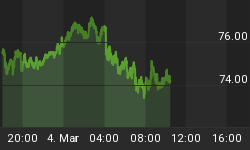Last week saw the global financial system tip from delusion -- where it had happily drifted for several years -- into chaos. Consider the following more-or-less randomly chosen data points:
French unemployment hits record high
Italian unemployment hits record high
Oil's price falls by $10.36/bbl, or 13.5%, in a single day, to its lowest price since 2010.
Copper falls by 6% to $2.86/lb, 25% below its 2013 high.
European bond yields fall to record lows. Even Italy, with government debt exceeding 130% of GDP, can now borrow for around 2%. Japan, meanwhile, issues bonds with negative interest rates.
European inflation approaches zero, with several member states apparently already in deflation.
Emerging markets see the opposite trend, as a soaring dollar causes their currencies to fall and inflation to spike. The Russian ruble falls by 7.3% to a record low, while the currencies of Brazil, Colombia, Mexico and Chile drop by at least 1.9%. See Brazil's Rousseff vows immense effort to slow inflation.
Chinese malinvestment, a topic of conversation ever since those ghost city pictures started circulating, is pegged at $6.8 trillion, or about 70% of China's entire economy.
As Prudent Bear's Doug Noland put it his November 28 Credit Bubble Bulletin, "Collapse of the 'global reflation trade' runs unabated. Where might contagion strike next?"
The answer is in one final set of stats: Last week the S&P 500 and Dow Jones Transports hit record highs, while the Nasdaq 100 index of tech stocks rose to its highest level since March 2000, just before its epic crash.
If everything but equities is being sucked into a 2008-style deflationary vortex, how much longer can US stocks hold out? Probably not long.
















